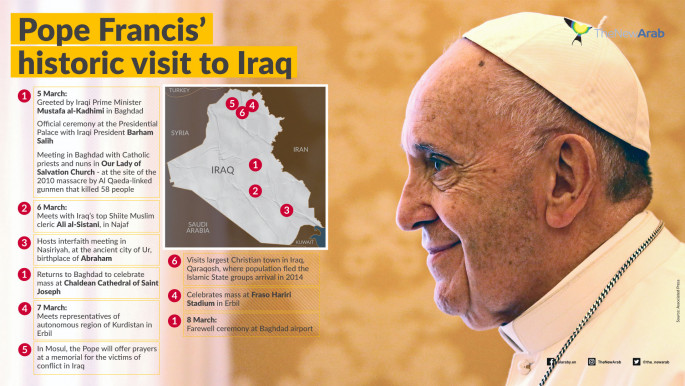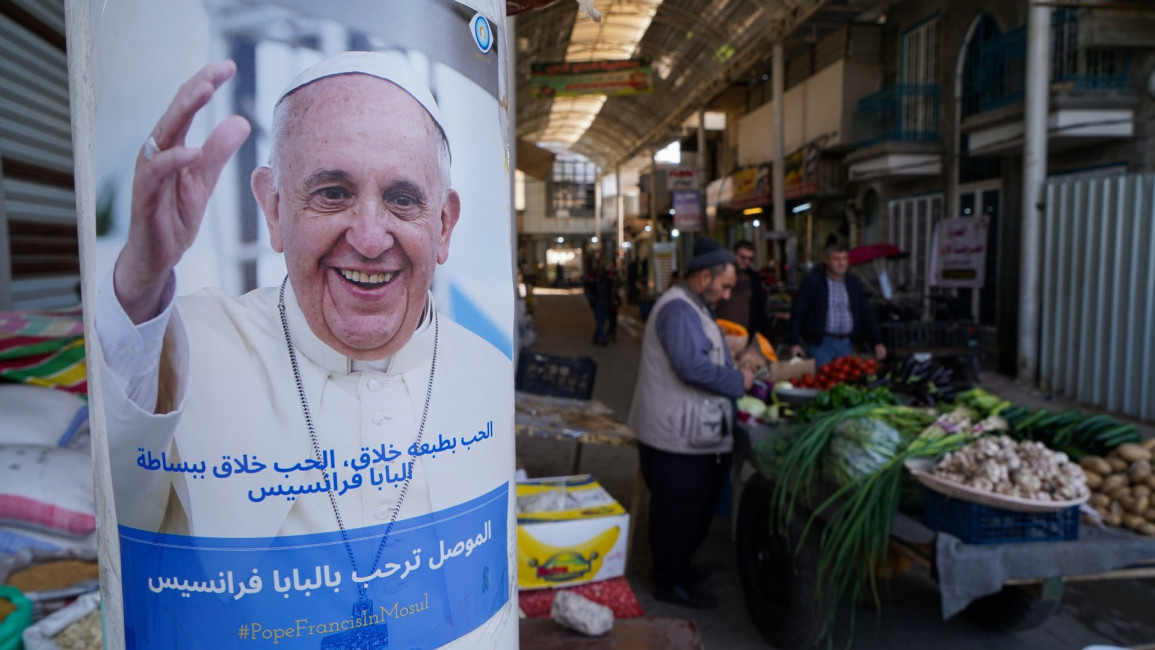
Beyond piety and PR: What Pope Francis must bring to Iraq
Go back for a minute to the year 2000 when Pope John-Paul II was getting ready to visit Iraq during the celebrations of the Jubilee Year. Like Pope Francis, he too had accepted an invitation by the Catholic bishops of Iraq to visit the country but the negotiations between the Vatican and Iraqi authorities faltered and the pontifical visit never took place.
This is one reason why, despite the twin threats of Covid-19 and terrorism, Pope Francis has insisted that the first ever papal visit to Iraq this week should go ahead. So this man, an 84-year old with only one lung, will embark upon his 33rd visit abroad in his eight years at the head of the Roman Catholic church. Interestingly, this is also the first visit abroad that Pope Francis has undertaken for over a year due to travel restrictions imposed by the coronavirus pandemic.
The papal itinerary will begin in Baghdad with a ceremony at the presidential palace that will be followed by an ecumenical meeting at the Syriac-Catholic Cathedral of Our Lady of Salvation. The following day, the Pope will travel south to the holy city of Najaf to meet the Grand Ayatollah Ali al-Sistani, the influential 90-year-old Shia Muslim cleric.
However, for the small Iraqi Christian community, the fulcrum of the trip will be the visit to the north of the country. This area celebrates a millennia-old Christian heritage. Thousands of Christians in the area were killed under the rule of the Islamic State between 2014 and 2017, and hundreds of thousands more fled their homes in the face of violence and persecution.
 |
He must bring consolation, closeness, fraternity, openness and friendship to the Catholic Church and its parishioners who have suffered greatly |  |
Pope Francis will visit the cities of Erbil, Mosul and Qaraqosh to meet people now trying to rebuild their communities and churches. In Mosul, for instance, he will also pray at a memorial for victims of Islamic State group (IS), and in Qaraqosh, he will visit the Saint Mary al-Tahera Cathedral which is being repaired after looting and damage caused by IS. In Erbil, a mass is scheduled to take place at a football stadium that will be sparsely attended due to the pandemic.
So why is this visit so important? Why are roads being paved and churches rehabilitated from Ur, the birthplace of the Prophet Abraham in the southern desert, to ravaged Christian towns in the north? Not only that, but posters of the Pope and flags of the Vatican can be seen everywhere from Baghdad's upper-class Karrada Quarter, where the Pope will visit two churches, all the way to Iraqi Kurdistan.
Any papal visit brings with it not only excitement but also a whole host of expectations. I recall coordinating with Rome Pope John-Paul II's visit in 2000 to the Holy Land. The tiny Christian minority in these biblical lands was agog with anticipation, and the Palestinian, Jordanian and Israeli political leaders all wanted to bask in the Pope's popularity. And in a sense, this will be repeated again in Iraq. It is an inevitable part of the papal charisma, piety and PR let alone its attendant consumerist industry.
 |
|
| [Click to enlarge] |
However, Iraq is teetering on the edge of becoming a failed state despite its enormous oil wealth. And the violence keeps rearing its ugly head as politics and religion risk cleaving the loyalties of Iraqis along sectarian lines. So Pope Francis must address three key objectives:
The first, and most obvious, is to bring consolation, closeness, fraternity, openness and friendship to the Catholic Church and its parishioners who have suffered greatly after years of persecution, political uncertainty or economic woes. And this inclusive pastoral attitude toward the Catholic churches will also extend to the other ecumenical churches in the country, not least the Assyrian, Armenian or Anglican churches.
After all, the Christian community of Iraq is one of the oldest and most diverse in the world, although their numbers have alas dwindled dramatically to well under 400,000 over the past couple of decades, with most Iraqi Christians concentrated in the northern province of Nineveh where some still speak a dialect of Aramaic that was also Jesus' language.
 |
It is my fragile hope that the papal venture will fall on fruitful hearts and that it will also help heal some of the Mesopotamian wounds |  |
The Pope's second objective is to voice solidarity with all Iraqis nationwide. This expectation is already palpable: from central Baghdad to the Shia shrine city of Najaf, welcome banners featuring Francis' image and the Arabic title "Baba al-Vatican" already dot the streets.
The Pope's Jesuitical message to Yazidis, as well as to other smaller communities, is that his Church stands alongside those who suffer, and he will utter powerful words against those crimes against humanity that have been committed since the overthrow of Saddam Hussein.
But it is the third objective that will be the most preeminent during this visit. During his pontificate, Pope Francis has been an outspoken proponent of interfaith dialogue. This approach became clear when he visited Abu Dhabi in 2019 and where he met Sheikh Ahmed al-Tayeb, the imam of the Al-Azhar mosque in Cairo who is a key authority for Sunnis worldwide. Together they signed a document encouraging Christian-Muslim dialogue. And it is this same media-friendly objective that will prevail when he meets the Grand Ayatollah at his humble home in Najaf.
Read more: Pope says he will visit Iraq as 'pilgrim of peace'
Indeed, not unlike his visit to the UAE and his interaction with Sunni Islam, Pope Francis hopes that his trip to Iraq could open a similar door to Shia Muslims who number roughly 200 million worldwide and are also the majority in Iraq. The Grand Ayatollah is the foremost Shia cleric with an extremely palpable influence, and it will be interesting to gauge the nature of the joint statement that comes out of this meeting.
However, I am long enough in the tooth when it comes to ecumenical or inter-faith operations to restrain myself from waxing lyrical about this pontifical "pilgrimage". I realise that it will doubtless have an impact in terms of some lingering memories that inevitably increase good faith and help enhance mutual trust between Muslims and Christians as followers of the Abrahamic faith. But I also know Levantine realities well enough to suggest that all this goodwill could dissipate quite abruptly.
So I simply leave readers with the image of the Parable of the Sower that is drawn from three of the four Christian Gospels. In this biblical allegory, the soil that the seed fell on represents four different reactions to the Word of God: the hard heart, the shallow heart, the crowded heart and the fruitful heart.
It is my fragile hope that the papal venture will fall on fruitful hearts and that it will also help heal some of the Mesopotamian wounds.
Dr Harry Hagopian KSG is a Public International Lawyer. He was Executive Secretary of the Jerusalem Inter-Church Committee and Assistant General Secretary of the Middle East Council of Churches in Beirut.
Have questions or comments? Email us at: editorial-english@alaraby.co.uk
Opinions expressed in this article remain those of the author and do not necessarily represent those of The New Arab, its editorial board or staff.




